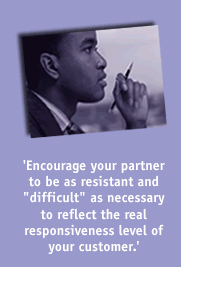
'Make Believe' Can Make You Better
| Ïðîäàæè | ||||
| Sales.com | ||||
| Preparing... | ||||
by Stephen E. Heiman, Diane Sanchez with Tad Tuleja
In our Conceptual Selling programs, participants work in teams to practice the principles we've just been teaching them, with the person who is actually going to make the sales call playing himself and the partner they're working with taking the part of the customer. This kind of exercise, where people are allowed to run through the basics of a call in a low-stress, no-risk environment, enables them to become comfortable with the process more readily than they could if they just jumped into the call feet first. We recommend that you do a similar exercise. In this exercise, you'll be doing what would be the equivalent of a dry run.
 Select
a friend, fellow salesperson, or family member to play the role of your
customer. Take about five or 10 minutes to brief that person on the selling
situation. The briefing will, of course, vary depending on the particular
situation, but you will at least want to fill your rehearsal partner in
on the following:
Select
a friend, fellow salesperson, or family member to play the role of your
customer. Take about five or 10 minutes to brief that person on the selling
situation. The briefing will, of course, vary depending on the particular
situation, but you will at least want to fill your rehearsal partner in
on the following:
Once you've briefed the person you'll be trying out the call on, take 10 or 15 minutes to go through the dress rehearsal. Encourage your partner to be as resistant and "difficult" as necessary to reflect the real responsiveness level of your customer. He will be able to do so, of course, only if you have briefed him properly beforehand.
We realize that the exercise that we're suggesting might not always turn out as realistically as you would like. Your partner might not be as perceptive or as demanding as your real customer will be and he certainly won't be as personally involved in the possible sales transaction. Rehearsal is only an approximation of what will happen when you sit down face to face with the client. Yet even such an approximation can bring you enormous benefits. The reason is that even in an artificial setting, you are able to lay down a preliminary but still useful map you can follow, with some necessary adjustments, in the call.
Athletes sometimes speak of mentally going over and over a given motion or technique until it becomes second nature so that they don't have to think about it in performance. Rehearsing a sales call with a friend seems to have the same function: It burns a basic path in your thinking that you can start from where you're actually in the call.
Adapted from The New Conceptual Selling Stephen E. Heiman, Diane Sanchez with Tad Tuleja © 1999 by Miller Heiman, Inc. All rights reserved with permission of Warner Books. Inc.